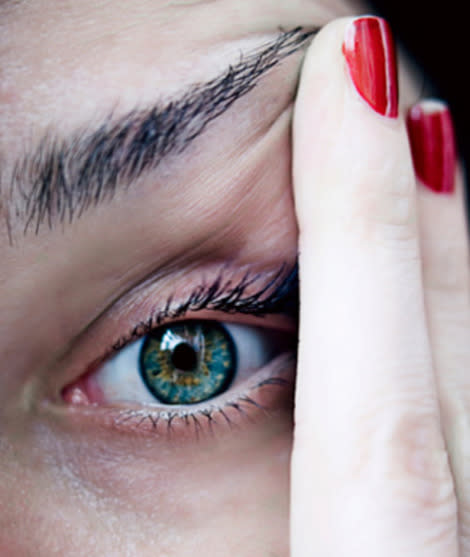Why Won't My Eye Stop Twitching?
by Charlotte Andersen for SHAPE.com

Possibly the only thing more irritating than an itch you can't scratch, involuntary eye twitching, or myokymia, is a feeling that many of us are familiar with. Sometimes the trigger is obvious (fatigue or seasonal allergies), while other times it's a total mystery. The good news is that it's rarely a cause for concern.
"Nine out of 10 times, [eye twitching] is nothing to worry about, it's just more of an annoyance than anything else," says Dr. Jeremy Fine, a Los Angeles-based concierge doctor. But just because it's not dangerous doesn't mean you should grin and bear it. We asked experts to share some lesser-known reasons why this happens and tips on how to quit the twitch fast.
1. Stress: Stress is the number one reason for a twitchy eye, or eye spasm, says Dr. Monica L. Monica M.D., a clinical spokesperson for the American Academy of Ophthalmology. "Typically the patient deals with the twitching for a week or so when something is troubling them, they are in final exams, or just not sleeping well."
In most cases, the twitching resolves on its own once the stressful situation ends, but making an effort to reduce the stress in your life or practice other coping techniques like meditation can help. Studies show that people who practice mindful meditation-sitting quietly with your eyes closed and repeating a word or "mantra" over and over-for just 20 minutes a day reap significant mental health benefits.
RELATED: 6 Things You Should Tell Your Doctor But Aren't
2. Caffeine or alcohol: Many experts believe that the stimulants in caffeine and/or the relaxant properties of alcohol can bring on a twitchy eye, especially when used in excess. "I know it's unrealistic for me to tell my patients to stay away from caffeine and alcohol, but if you've recently increased your normal intake, you may want to scale back," says Julie Miller, M.D., a New Jersey-based plastic surgeon who specializes in eye health.
When it comes to your liquid intake, it's important to stay hydrated with pure water and to stay away from real and artificial sugars," adds Dr. Katrina Wilhelm, a board certified naturopathic physician. If you can't cut your morning cup, try to limit yourself to one coffee drink per day.
3. Mineral deficiencies: According to Dr. Fine, a magnesium deficiency is the most common nutritional imbalance leading to eye twitches. If the twitch persistently recurs or is really bothering you, he suggests getting your magnesium levels checked (a simple blood test is all you need). If you're deficient, focus on eating more magnesium-rich foods like spinach, almonds, and oatmeal, or start taking an over-the-counter magensium supplement to easily meet your daily needs (310 to 320mg for adult women, according to the Institute of Medicine of the National Academy of Sciences).
4. Dry eyes: Overly dry eyes "can be a result of getting older, contact lenses, or certain medications," Dr. Fine says. But there's usually a simple solution. Dr. Fine suggests changing your contacts as often as prescribed and checking the side effects of any medications you take. You can also "distract the brain by placing artificial tears or cold water in your eye," suggests Dr. Benjamin Ticho, a board certified ophthalmologist and a partner at The Eye Specialists Center.
5. Eye strain: A number of things can cause eye strain (and the pulsating eyelid that results), Dr. Miller says. Some of the most common culprits include not wearing sunglasses on a bright day, wearing eyeglasses with the wrong prescription, staring at your computer for hours on end without an anti-glare screen cover, and smartphone or tablet usage. "Give your eyes a break! Put on sunglasses, wear your eyeglasses, and step away from the devices," she adds.
6. Jaw clenching or teeth grinding: Many people tighten their jaw or grind their teeth while sleeping, so you may be doing it without even knowing! If you suspect you might be grinding (your significant other might even be able to hear it), a trip to the dentist can quickly reveal the truth. If they tell you you're "bruxing," the fancy term for teeth grinding, ask about options like wearing a mouth guard at night. In the meantime, doing a little self massage on your jaw and inside your mouth can help relieve any pain, even though it sounds a little icky.
RELATED: 10 Simple Rules for a Healthy, Happy Life
7. Other potential causes: Sometimes eye twitching can be indicative of a larger medical problem. Hypoglycemia, Parkinson's disease, Tourette's Syndrome, and neurological dysfunction can all cause your eye to spasm. If you've tried all of the previous mentioned remedies and haven't found relief and/or have other worrisome symptoms, see your doctor immediately.
More on SHAPE:
6 Moves for a Sculpted, Sexy Lower Body
10 Healthy Peanut Butter Recipes
The 21 Best Health and Fitness Sites for Women
